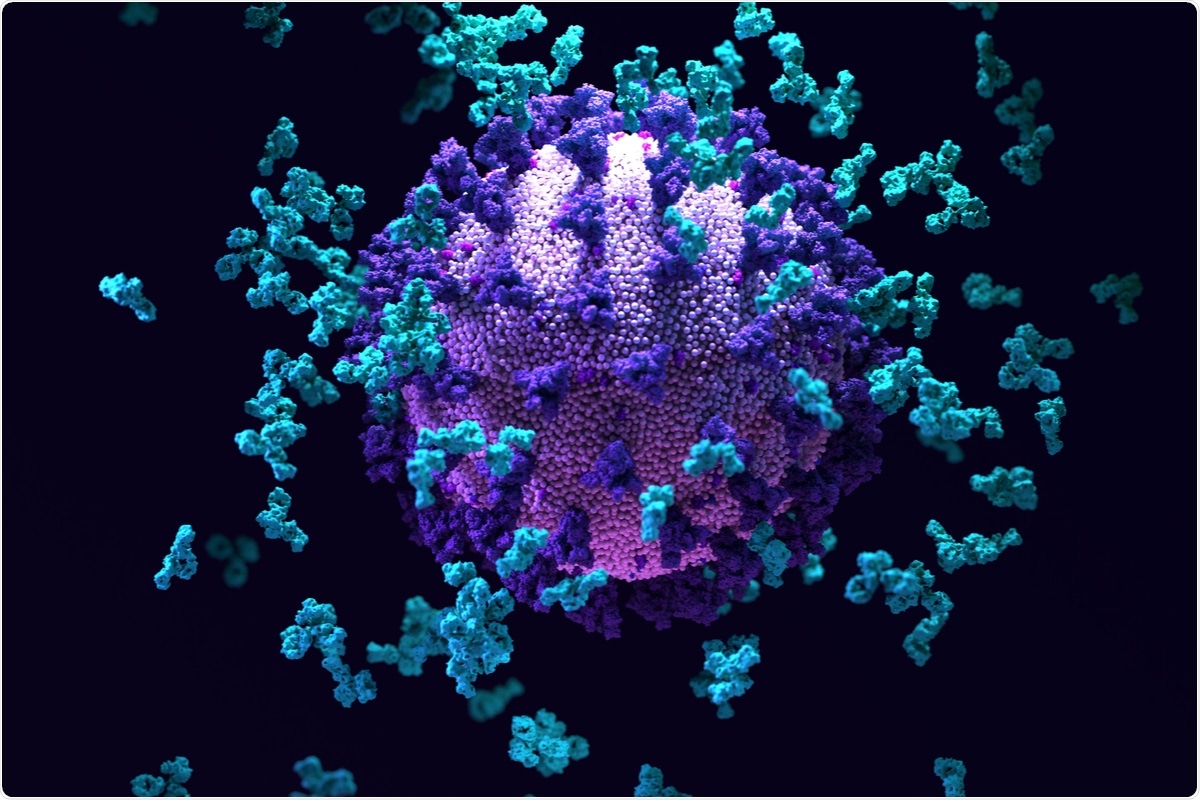The ongoing coronavirus disease 2019 (COVID-19) pandemic has caused an economic and healthcare crisis. COVID-19 is caused by the severe acute respiratory syndrome coronavirus 2 (SARS-CoV-2), a positive-stranded and RNA virus belonging to the family Coronaviridae. This virus is highly virulent and has already claimed more than 4.66 million live worldwide.
 Study: Neutralizing Monoclonal Antibodies That Target the Spike Receptor Binding Domain Confer Fc Receptor-Independent Protection against SARS-CoV-2 Infection in Syrian Hamsters. Image Credit: Design_Cells/ Shutterstock
Study: Neutralizing Monoclonal Antibodies That Target the Spike Receptor Binding Domain Confer Fc Receptor-Independent Protection against SARS-CoV-2 Infection in Syrian Hamsters. Image Credit: Design_Cells/ Shutterstock
Scientists believe that global vaccination is the key to contain the pandemic. Several COVID-19 vaccines have received Emergency Use Authorization (EUA) from various regulatory bodies worldwide. To date, the available vaccines target the spike (S) protein of SARS-CoV-2. The S protein is primarily responsible for the virus and host interaction and mediates COVID-19 infection. Vaccines induce neutralizing antibodies that target the S protein of SARS-CoV-2.
Neutralizing and non-neutralizing antibodies
The role of antibodies against SARS-CoV-2 is to target the S protein's receptor-binding domain (RBD) or N-terminal domain (NTD). These antibodies prevent SARS-CoV-2 infection via various mechanisms, such as blocking the binding of the RBD of the virus with the angiotensin-converting enzyme 2 (ACE2) receptors of the human host. As RBD is immunodominant, it is targeted by the neutralizing antibodies in SARS-CoV-2 infected patients.
Scientists explained that both neutralizing and non-neutralizing antibodies confer protection via Fc-mediated effector functions. These antibodies interact with Fcγ receptors (FcγR) on natural killer cells and stimulate antibody-dependent cellular cytotoxicity (ADCC). Also, they interact with phagocytes to trigger antibody-dependent cellular phagocytosis (ADCP).
Previous studies of influenza viruses revealed that strain-specific neutralizing monoclonal antibodies (MAbs) target the head domain of the hemagglutinin (HA) and provide protection through the Fc-independent mechanism. MAbs obtained from COVID-19 recovered patients have shown promising therapeutic effects in non-human primates, mice, and hamsters. Also, currently, many MAbs are being assessed for their potential as treatment options for COVID-19.
Every vaccinated or COVID-19 recovered individual possesses a spectrum of antibodies, but their neutralizing power varies. The reason for such a difference in the in vivo protective capacity is not well understood. Also, there is a lack of research that explains the significance of the functions of Fc-mediated effector protein.
Monoclonal antibodies and COVID-19
An earlier study revealed the neutralizing ability of MAbs in a murine model of SARS-CoV-2. It developed a panel of RBD-targeting murine MAbs with differential binding affinities and neutralizing activities. A new study by the same group of researchers described the roles of neutralizing and non-neutralizing antibodies against SARS-CoV-2. The current study, published in the journal mBio, analyzes the capacity of the neutralizing MAb 2B04 to protect different antibody titers.
Researchers revealed that MAb 2B04 protects hamsters against COVID-19 infection in a prophylactic and therapeutic infection model at 50% inhibitory concentration [IC50] of 0.04 μg/ml. They explained that this protection is connected with a reduction in viral loads in the nasal turbinates and lungs of the infected hamsters. Also, researchers found that MAb 2B04 protected the hamsters from a reduction in weight loss owing to SARS-CoV-2 infection. Interestingly, scientists found that MAb 2B04 could block aerosol transmission of the virus to naive contacts. This study has reported that MAb 2B04 can reduce the viral load and disease severity when administered during pre- or postexposure therapy.
The authors of this study have also evaluated three other MAbs, namely, 2C02, 2C03, and 2E06. They found that these MAbs could identify distinct epitopes within the RBD of the S protein and offered minimal (2C02 and 2E06) or weak (2C03) virus-neutralizing ability in vitro. However, only 2C03 protected Syrian hamsters. MAb 2C03 protected the infected Syrian hamsters from weight loss and reduced the lungs' viral load. Importantly, scientists revealed that when 2B04 and 2C03 were administered prophylactically, Fc-Fc receptor interactions were not required to elicit protection.
Conclusions
The current study has shown that monoclonal antibodies can prevent or treat SARS-CoV-2 infection in Syrian hamsters. The authors revealed that MAbs that target the RBD of the S protein could protect against SARS-CoV-2 in vivo. Interestingly, MAbs can effectively protect a host from SARS-CoV-2 under a wide range of neutralizing titers. Also, MAbs 2B04 not only has therapeutic properties but could also reduce aerosol transmission.
Journal reference:
- Su, W. et al. (2021). Neutralizing Monoclonal Antibodies That Target the Spike Receptor Binding Domain Confer Fc Receptor-Independent Protection against SARS-CoV-2 Infection in Syrian Hamsters. mBio. doi:10.1128/mBio.02395-21